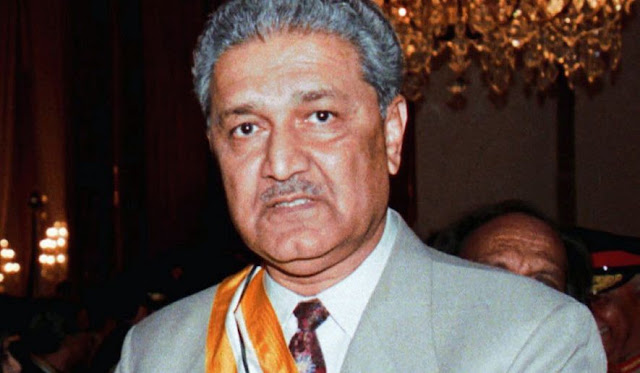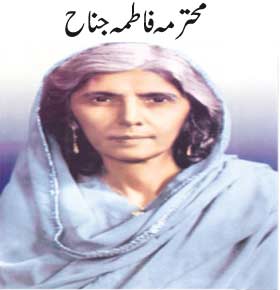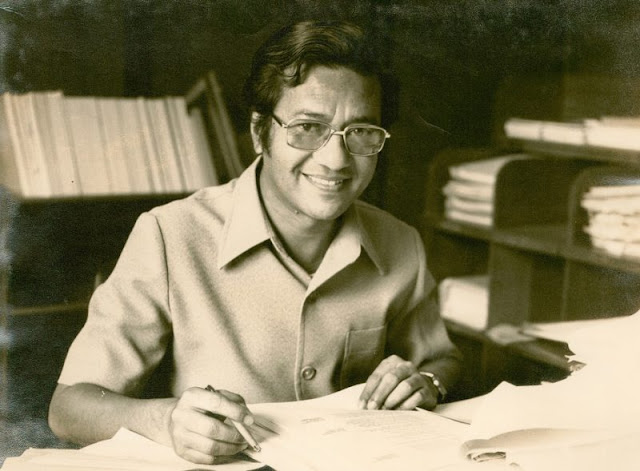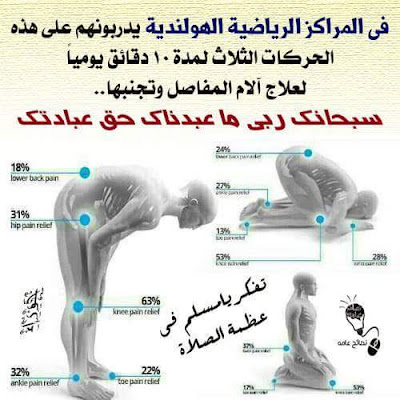Abdul Qadeer Khan
Dr. Abdul Qadeer Khan (born 1 April 1936) known as Dr. Abdul Qadeer Khan, is a Pakistani columnist, nuclear physicist and a metallurgical engineer, who founded the uranium enrichment program for Pakistan's atomic bomb project. Abdul Qadeer Khan founded and established the Kahuta Research Laboratories (KRL) in 1976, serving as both its senior scientist and Chairman until he retired in 2001. Khan was also a figure in other Pakistani national science projects, making research contributions to molecular morphology, the physics of martensite alloys, condensed matter physics, and materials physics.
In January 2004, the Pakistani government summoned Khan for a debriefing on his active role in nuclear weapons technology proliferation in other countries after the United States provided evidence of it to the Pakistanis. Khan formally admitted his responsibility for these activities a month later. The Pakistani government dismisses allegations that Pakistani authorities sanctioned Khan's activities.
After years of official house arrest during and following his debriefing, the Islamabad High Court (IHC) on 6 February 2009 declared Abdul Qadeer Khan to be a free citizen of Pakistan, allowing him free movement inside the country. The verdict was rendered by Chief Justice Sardar Muhammad Aslam. In September 2009, concerned because the decision also ended all security restrictions on
Khan, the United States warned that Khan still remained a "serious proliferation risk"
Early life
Abdul Qadeer Khan was born in 1936 in the Indian city of Bhopal. At the time, the entire Indian subcontinent was still a part of the British Empire, but things would soon change dramatically. In 1947, British rule finally ended, and two new countries were suddenly created: India and Pakistan. Pakistan was designated as a Muslim country, while India was primarily Hindu.
However, both Hindus and Muslims lived throughout both of the new countries. Over the next few years, over four million Hindus moved from Pakistan to India, while over six million Muslims went the other way. It was the biggest mass movement of people in history, and it was not without conflict. Hundreds of thousands of people died as conflict broke out between the two groups.
Khan's family were Muslim, but Bhopal was on the Indian side of the partition. Initially, they decided NOT to migrate to Pakistan because they didn't think life was all that bad where they were. However, as the violence between Hindus and Muslims continued to increase, four of Khan's older siblings decided to leave Bhopal for the Pakistani city of Karachi.
Then, in 1952, a sixteen-year-old Abdul Qadeer Khan made the harrowing journey to Pakistan as well. He traveled with a group of other Muslims from Bhopal, and on the way, they were harassed, robbed, and beaten by the Indian railroad workers and police, who were Hindu. Finally, they arrived at the end of the train line and walked the last five miles across a blistering desert to make it to Pakistan.
1971 war and return to Pakistan
On 20 January 1972, President Zulfikar Ali Bhutto approved a crash program to develop an atomic bomb after a seminar – the Multan meeting – with scientists at Multan. Reporting directly to Bhutto, the program was managed by Munir Ahmad Khan, the chairman of the Pakistan Atomic Energy Commission the outcomes of the 1971 war had greatly threatened Pakistan's strategic position. Earlier efforts had attempted Implosion-type nuclear weapons using military-grade plutonium.
Before 1974 Khan had no knowledge of the program, which calls into question his "father-of" claim. Following India's surprise "Smiling Buddha" in 1974, Bhutto accelerated Pakistan's effort to attain atomic capability. Sensing the importance of the test, Munir Ahmad launched the secretive Project-706.
After learning about the nuclear test, Khan wanted to contribute to the military posture. He approached Pakistan government officials, who dissuaded him, saying it was as "hard to find" a job in the Pakistan Atomic Energy Commission as a "metallurgist".
Undaunted, he wrote to Prime Minister Bhutto, highlighting his specific experience, and encouraged him to develop an atomic bomb using military-grade uranium. According to Kuldip Nayyar, although the letter was received by Prime minister Secretariat, Khan was still unknown to the Pakistan government, leading Bhutto to ask the ISI to run a complete background check and prepare an assessment report on him. The ISI assessed him as "incompetent" but Bhutto was unsatisfied and eager to know more about him, eventually asking Munir Ahmad to dispatch a Pakistan Atomic Energy Commission team to meet him. The Pakistan Atomic Energy Commission team, including Bashiruddin Mahmood, arrived at Almelo at his family home at night. After an interview, the team returned to Pakistan and Prime Minister Bhutto decided to meet with Khan and directed a confidential letter to him. Soon after, Khan took a leave from Urenco and departed for Pakistan in 1974.
Books
- Khan, Abdul Qadeer (1972). Advances in Physical Metallurgy (in English, German, and Dutch). Amsterdam, Netherlands: Elsevier Press.
- Khan, Abdul Qadeer (1983). Metallurgical Thermodynamics and Kinetics (in English, German, and Dutch). Islamabad, Pakistan: The Proceedings of the Pakistan Academy of Sciences.
- Khan, Abdul Qadeer; Hussain, Syed Shabbir; Kamran, Mujahid (1997). Dr. A.Q. Khan on science and education. Islamabad, Pakistan: Sang-e-Meel Publications.









Comments
Post a Comment
Thank you is much. I appreciate it to you and be happy to give me little pressure to upload more blogs. Be my follow